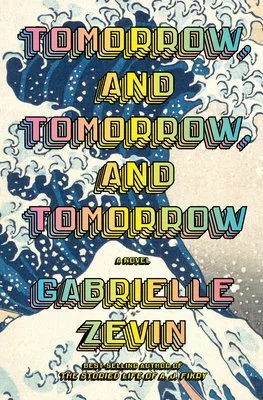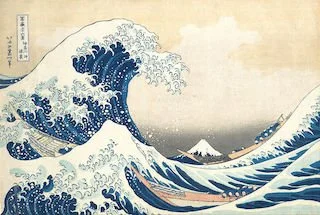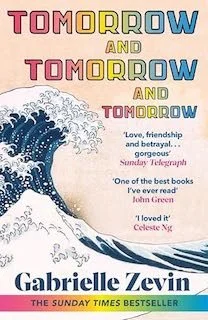Book Review -Tomorrow, and Tomorrow, and Tomorrow by Gabrielle Zevin
‘Tomorrow, and Tomorrow, and Tomorrow' by Gabrielle Zevin is the story of Sadie and Samson, two friends united by a love of video games who turn it into a successful business, with the help of their friend Marx. The book follows the development of their relationship over the decades.
The couple first bond over a love of 'donkey kong' in the games room of a hospital when they are young adults. Later, MIT computer student (Sadie) and Harvard maths student (Samson Mazer) bump into each other in a Boston train station, and this is the start of a creative partnership that blossoms over the years. But is there anything else blossoming?
Firstly, I couldn't help as I read the book to draw comparisons with ‘A little life’ - another book set over the decades that follows the ups and downs course of long friendships, and how they change over the years. In a similarity with a character from that book (Hey Jude), Sam also has disabilities and it’s about how he hides these injuries to begin with before he learns how to live with both them and trauma. Though I should say that's where the comparison ends - there's nothing like the graphic or intense detail in 'A Little Life' (not much does).
Sam doesn't want to be defined by his disabilities and goes out of his way not to show pain in front of his friends. There’s also the possibility that he has autism, not that it is spelled out, nor should it be. Instead, he prefers to be defined by his games, and indeed he happily adopts the role as a mayor of Maple Town in ‘Both Sides’. The main character in the same game is called Alice, and Sam uses her character to show 'the story of his pain, in the present and in the past'.
Relationship/Friendship
Sadie is a gifted game designer, and in her childhood, she turned to games as a way of feeling a bit overlooked in her family, due to her sister's illness. During the book, she finds herself in an unhealthy relationship and dealing with depression and grief. She's a bit more in the background as the two become more famous, which is something mentioned during a conversation about the painting ‘Cherry Blossoms at night’ by Katsushika ōi:
‘it is a painting about the creative process - its solitude and the ways in which an artist, particularly a female one, is expected to disappear.’
What I liked about the book is that it wasn't a will they/won't they storyline. It's about how you can love someone, without being lovers. Friends can become frenemies. And maybe that tension contributes to their creative dynamism.
Computer games
I loved computer games when I was younger, I had a Spectrum 128k whilst over the years my friends had Ataris, Nintendos, Sega Mega Drive, and the rest. At one stage I picked up an Xbox, and then I tried games on the PlayStation again during lockdown and enjoyed 'Red Dead Redemption' and 'The Last of Us' (played those two installments back to back). I enjoyed the explanations behind the inspiration and development process of the games, and appreciate them as an art form. If you're not a gamer it mightn't grab your attention in the same way, but I don't feel it would impede the narrative of the novel.
It did make me think about 'Utopia Avenue' by David Mitchell - in that book, Mitchell has to describe music in such a way to make you feel that it’s real, which he does by referring to other songs and artists, using them to create an outline, so you can conjure up the sounds. In 'Tomorrow, and Tomorrow, and Tomorrow', Gabrielle Zevin does something similar - there are enough mentions of other games to allow you to imagine the games they create. I know I’d certainly like to play ‘Master of the Revels’, a murder mystery set in the world of Elizabethan theatre, or the puzzle platform ‘Ichigo’ with its art inspired by ’The great wave off Kanagawa.’
I know a lot of people played 'Animal Crossing', 'Harvest moon' and 'Stardew Valley' so the elaborate RPG ‘Both sides’ with its dual worlds would have been enough to see people through a couple of lockdowns and you can easily imagine the fandom around it.
‘….virtual worlds can be better than the actual world. They can be more moral, more just, more progressive, more empathetic and more accommodating of difference. And if they can be, shouldn’t they be?’
Infinite Restarts
'Tomorrow, and tomorrow, and tomorrow' is from a speech by Macbeth Shakespeare on the futility of life, ’the sound and the fury’. In the context of this book, it’s about how we don’t die in games, but are continually born again, with the chance for redemption if we avoid the pitfalls that killed us last time out. If only, eh?
‘The world of infinite restarts. Start again at the beginning, this time you might win.’
There is a section in the book called ‘pioneers’ that I wasn’t sure about. I can see why the author included it, but in retrospect, I think it made sense in terms of Sam and Sadie's relationship. If I had one complaint, it was that Marx seemed a little bit bland and one-dimensional. But again, writing this review, perhaps in computer parlance he was a NPR. He was there to move the story along.
Summary
There were times I felt it was heading toward something too sweet, but it pulled back, giving it a natural feel and I liked how it was a slow burner. There was a lot of hype surrounding this book when it came out, which I largely avoided. I liked the exploration of Sam and Sadie's relationship over the decades, and how friendship changes, as well as the importance of taking chances creatively. I enjoyed this, even though I wouldn't have been the target audience for the book.
Amazon UK Amazon US Amazon AUS
First published July 5, 2022 by Penguin Random House




